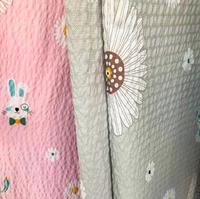Pressure Bubble Fabric Supplier Introduces What Is Patchwork Em
-
After the improvement of people’s living standards, clothes used to only play a role in keeping warm, but now clothes are a manifestation of a person’s taste and charm. The styles of the clothes and the patterns on them are all different. People often wonder how the embroidery patterns on clothing are embroidered. The embroidery process of the garment embroidery factory is to look at the craft list first, then position the fabrics for the clothes, computer embroidery and then adjust the bottom line for trial embroidery. After checking the craft list, normal embroidery can be started. After completion, the finished product can be inspected. Pressure Bubble Fabric Supplier introduces the process classification of garment embroidery:
1. Three-dimensional embroidery is to put foam on the clothing material, and then perform high-density embroidery on it. After embroidering the pattern, cut it up and take it out. Polyurethane foam can make the embroidery have a three-dimensional effect. Applique embroidery is an ornament that is cut from a piece of fabric and then sewn onto the garment. The edge of the fabric is usually stitched. Moreover, appliqué embroidery can embroider fabrics that are difficult to embroider, such as decorative bottom layer and continuous-color embroidery, which cannot be completed by ordinary embroidery.
2. Applique embroidery, also called tangent, is to cut one or more layers of fabric and attach it to the garment to show the bottom or blank form of the fabric. The step is to cut the applique cloth according to the pattern requirements and stick it on the embroidered cloth, then use some foam cotton and other things to make the pattern convex and three-dimensional, and then lock the edges after the pattern is pasted. Nowadays, garment embroidery factories embroider various patterns and laces on clothes through dozens of embroidery forms, which increase the beauty of clothes and satisfy consumers' demand for clothes.

